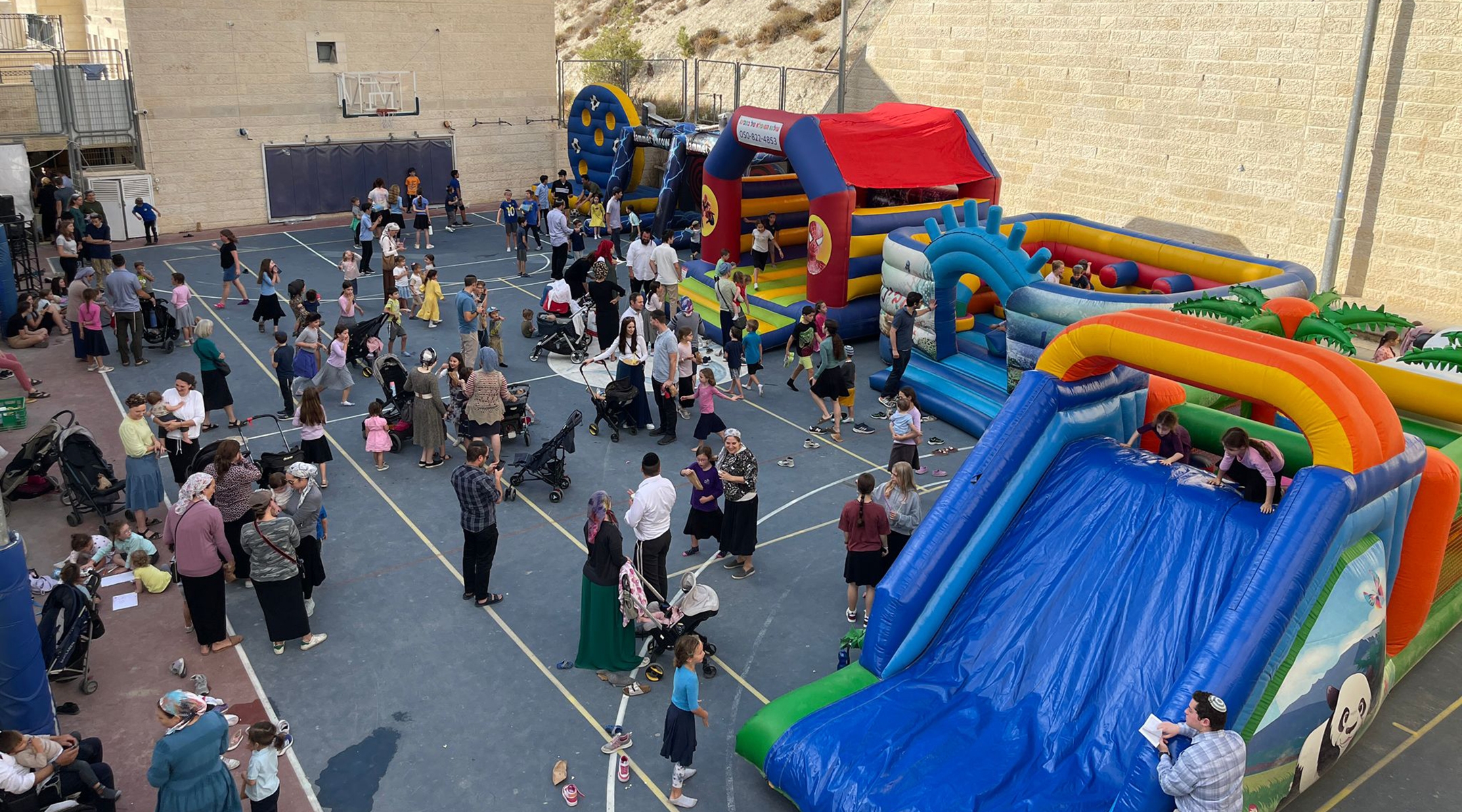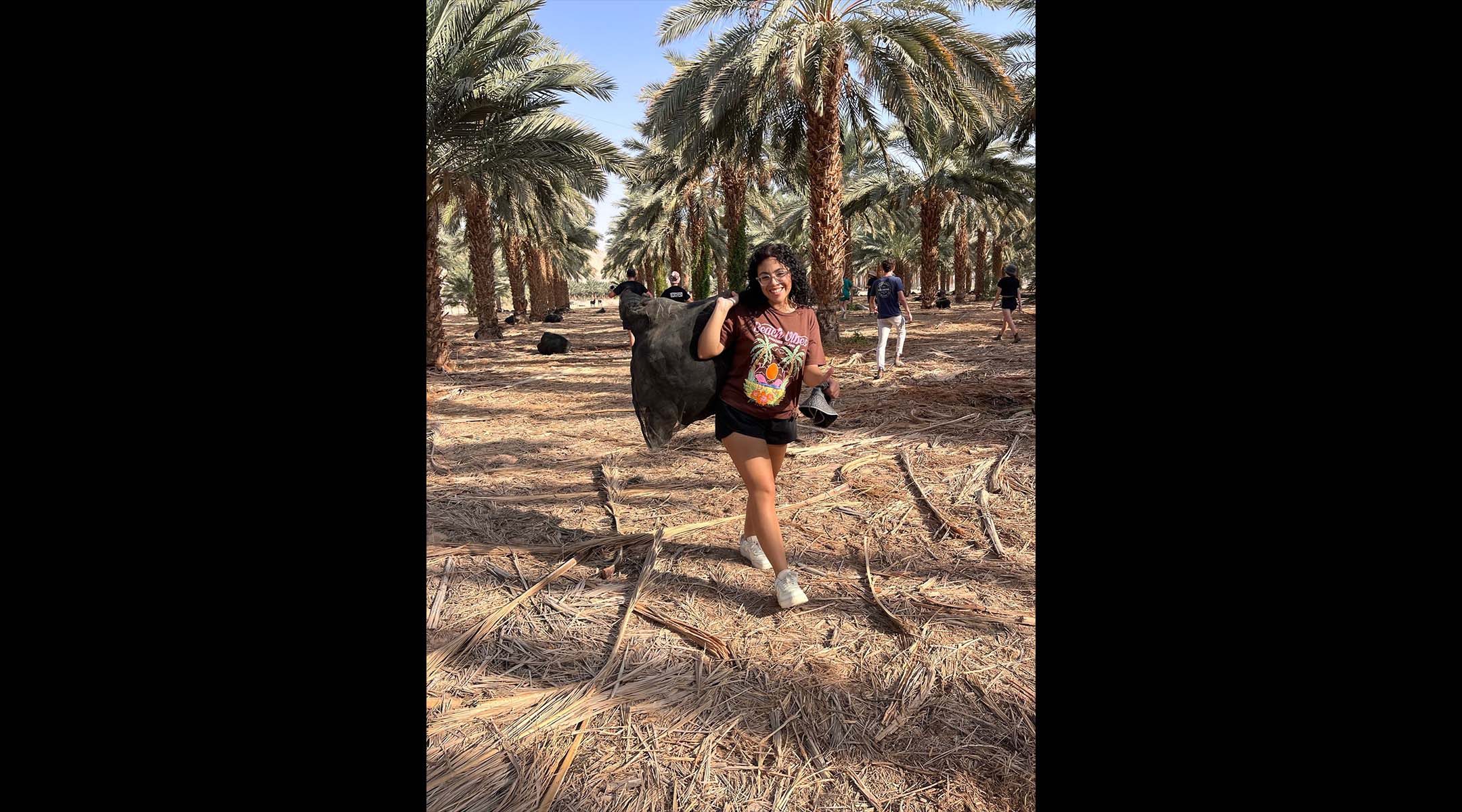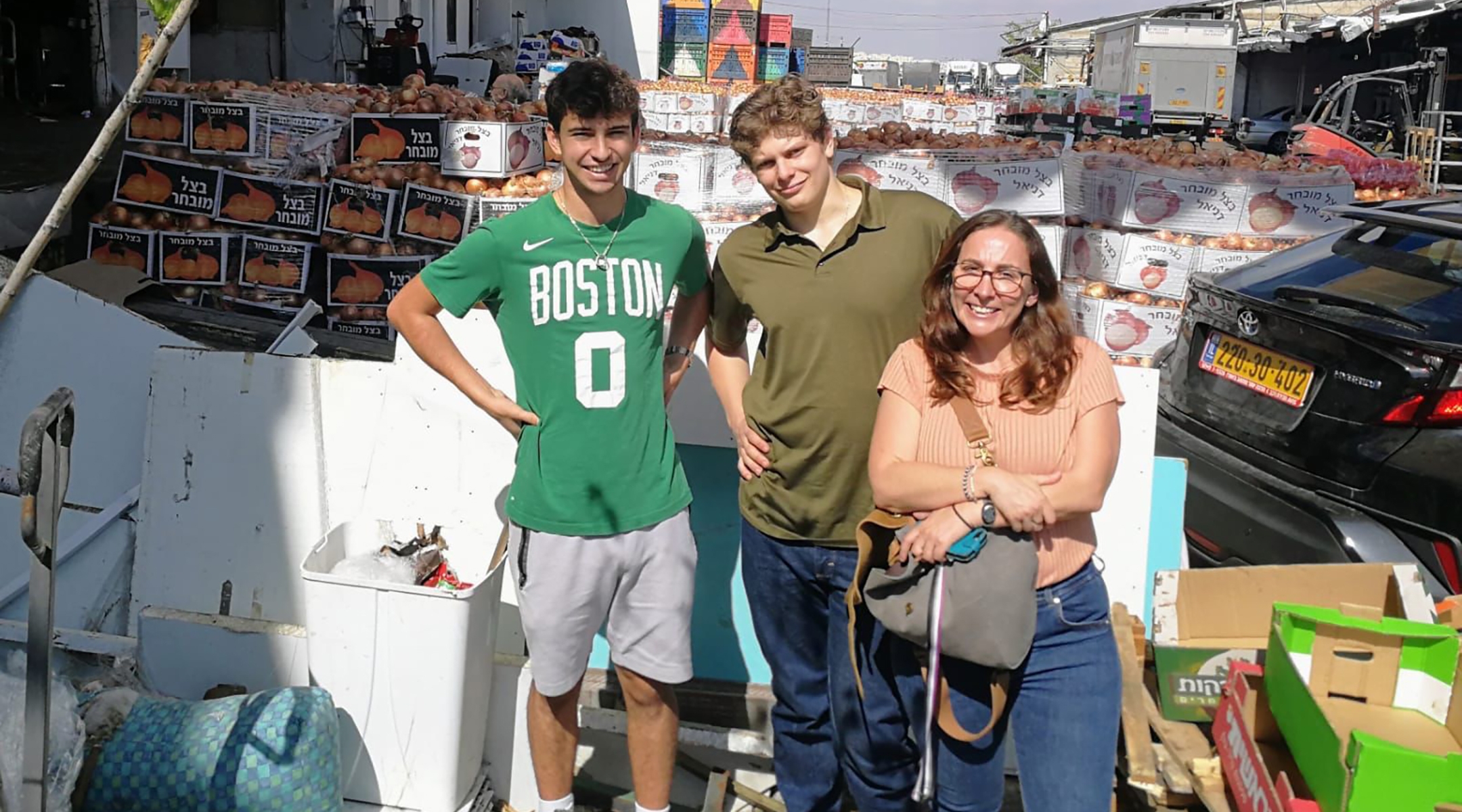This article was produced as part of JTA’s Teen Journalism Fellowship, a program that works with Jewish teens around the world to report on issues that affect their lives.
(JTA) — On a night where students at Yeshivat Lev HaTorah would typically be up late learning Torah, they were taking shifts volunteering at a local grocery store. Students restocked shelves for Yesh Chessed, a grocery store in Beit Shemesh facing staffing shortages amid the war in Israel. Their support allowed the store to remain open and serve Israeli families.
“The entire general vibe of all of Israel right now is, ‘If you can help, you help,’” Eli Cohen, a recent high school graduate from Atlanta, Georgia on a gap year at Lev HaTorah, said while tying tzizit garments to send to soldiers.
Participants in Israel-based gap-year programs like Lev HaTorah have joined nearly half of all Israelis in volunteering in the weeks since Hamas launched an attack killing 1,200 Israelis and causing the army to mobilize roughly 360,000 reservists. For some programs, however, adapting to the situation in Israel has not been easy.
The war in Israel forced gap-year programs, which attract high school students, recent graduates and college students from abroad for extended stays in Israel, to adjust their routines on short notice. Schools now accommodate increased student volunteerism in their schedules. Many programs are overcoming staffing shortages as faculty and staff join reserve duty or need to support their families. Schools have placed added focus on the safety and well being of their students and faculty.
Amid the crisis, some students chose to leave their programs in Israel. Masa Israel Journey, a nonprofit that oversees many gap-year programs, began the year with 5,700 fellows in Israel. Around 4,000 remain during the war, with a portion of those who initially left now returning.
And some programs suspended their activities altogether. Alexander Muss High School in Israel, a study abroad program for teens, sent its roughly 160 students back to America in order to relieve its staff members, according to JD Krebs, a school spokesperson, and not for safety concerns. “We have an entire staff and faculty made up of Israelis who are affected by the war,” Krebs told JTA. “We felt we needed to give them the time they needed to spend with their families.”
Before their homebound chartered flight on Oct. 12, Muss students launched a fundraising page, which raised over $120,000 for those impacted by the war. In addition, they made 1,600 care packages for displaced families.
Programs that remain open in Israel struggle with staffing issues as well. Several counselors at Aardvark Israel, a gap-year program that offers studies and internships in Tel Aviv and Jerusalem, left for reserve duty. Emma Flanders, an Aardvark admissions coordinator, said that other staff members fill in vacancies. “We’re a very close staff and very close community,” said Flanders. “That’s our friends on the frontline. Of course, I’m going to go in, help them and help their students.”

Yeshivat Lev HaTorah in Beit Shemesh, Israel hosted a carnival for local families and children whose schools were closed amid the war. (Yeshivat Lev HaTorah)
Aardvark student Donovan Ahlquist, 18, said that many of his peers returned to America out of safety concerns. Still, he said that the students and counselors who remain have grown more connected to each other. “It’s really wonderful having people here to talk to about it,” said Ahlquist, “because we’re all going through the same… deeply traumatic event.”
By staying in Israel, Ahlquist said that he knows he is helping the country and its people in a time of need. “Without Israel, we have nothing,” he said. “Israel is our home. Israel is everything.”
Ahlquist’s original goal of personal growth for his gap year remains unchanged, even as he supports Israel through the crisis. “While I’m here, I can stay here and help out as much as I can,” said the New Orleans teen. “Then I know that I’m being useful, and I am still going to grow as a person.”
In response to the war, Aardvark has been trying to foster unity amongst its students. “A lot of what we’ve been doing is actually bringing the students together more than they might be used to,” Aardvark’s Flanders said. The gap year program now allocates time for more community-building events such as movie nights and yoga classes.
Aardvark also strives to maintain a sense of normalcy by encouraging students to continue their classes and internships, even virtually when necessary.
Some programs shifted entirely to virtual classes. Israel XP, a gap-year program at Bar-Ilan University, originally planned for its students to arrive on Oct. 10, three days after the war in Israel began. “We unfortunately had to delay the arrival of our students, but we have begun classes on Zoom,” Natalie Menaged, chief operating officer of Israel XP at Bar-Ilan University, told JTA. “We look forward to welcoming our students to Israel as soon as we can.”
Those that can continue operating in Israel use the opportunity to help Israeli communities in a time of crisis. On top of their normal classes, students at Midreshet Lindenbaum, a Jerusalem-based seminary, spend hours preparing packages for soldiers and craft kits for children who cannot attend school. Director of Programming Cheryl Burnat said that the seminary also hosted a community camp with activities for kids and a space for parents to relax over breakfast.

An Aardvark Israel student volunteering in the date farms at Kibbutz Ketura, near Eilat, where participants in the gap-year program spent a week after the initial attacks decompressing, volunteering and helping displaced families from Israeli towns near the Gaza border. (Aardvark Israel)
Lindenbaum student Jemima Schoen said that volunteering and dedicating her Torah study to Israeli soldiers helps lift her spirits and lessen her anxiety over the war. Schoen, an 18-year-old from Atlanta, Georgia, added that her presence in Israel gives her a different perspective of Israeli resilience. Unlike those in America who tend to focus on the tragedies presented in the news from afar, “here in Israel, people are really trying to move forward, help out and change things for the good,” she said.
Programs say they prioritize the security and mental well-being of their students, particularly in response to the situation in Israel. Students at Lev HaTorah now need their parents’ permission to leave the neighborhood, and the yeshiva makes an effort to keep students near shelters should a siren sound.
Staff members “have a personal investment in every single student, and the doors are always open, even in normal times,” said Ariella Mendlowitz, a spokesperson for Lev HaTorah. During the war, she said, the staff increased their availability to students.
Lev HaTorah also supports members of Lev LaChayal, its program for lone soldiers, or soldiers from abroad who often don’t have family in Israel. Yeshiva students gather and package essentials to send to former Lev HaTorah students who now serve in the Israel Defense Forces without immediate family members in the country.
The yeshiva wants its students to know that, through their initiatives, students are “staying here for a purpose,” said Mendlowitz.
Cohen was glad he decided to stay in Israel. “I can be here and I can make whatever difference that I can make, whether it’s absolutely miniscule or on a larger scale,” he said. Cohen said he no longer feels like an American visitor on a gap year but like an active contributor to Israeli society. “You never think you actually will wake up one day, at least from the American perspective, and see rockets flying through the sky,” he said. “It’s a call to action and a call to responsibility.”
JTA has documented Jewish history in real-time for over a century. Keep our journalism strong by joining us in supporting independent, award-winning reporting.






